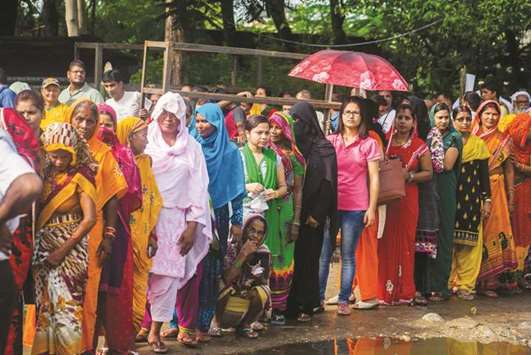Nepal yesterday completed its first local elections for nearly two decades, a key step in the country’s protracted post-war transition to a federal democracy.
Most of the country has already voted, but the local polls had been repeatedly delayed in a southern province bordering India which was the scene of deadly ethnic turmoil two years ago.
The government deployed troops and sealed the border before the ballot, fearing violence in the third phase of voting which covered around 2.6mn people.
The election commission put turnout at just over 60% as booths closed. There were a few arrests for voter fraud but no reports of unrest, it said.
The province around the city of Janakpur was hardest hit by deadly monsoon flooding last month which killed over 150 in Nepal and more than 1,200 across South Asia.
Some aid agencies, including the UN’s World Food Programme, suspended aid distribution before the polls.
“Political tensions have been running high in these districts in the run-up to the September 18 elections, giving rise to security concerns that caused delays to scheduled food distributions,” Pippa Bradford, WFP’s Nepal head, said.
Protests erupted after a new national constitution was adopted in 2015, nearly a decade after a long-running civil war ended with a fragile peace agreement.
Ethnic minority groups, especially in the south, said the charter left them marginalised and agitated for a greater stake in Nepal’s future governance.
Simmering tensions have remained. A political party representing the Madhesi ethnic minority, who live in the lowlands that border India, had refused to take part in the local polls unless an amendment to the constitution was passed.
The party later softened its stance, angering some voters who still refused to vote yesterday without those crucial concessions being made.
“The big parties have always pushed our agendas away and now the Madhesi party has also betrayed us by going to elections without amending the constitution,” said Saroj Mishra, a resident of Janakpur, who refused to vote yesterday.
The local polls are among the final steps in the agreement that ended a brutal 10-year Maoist insurgency in 2006. They paved the way for provincial and general elections later this year.
Since the end of the war, the country has suffered persistent instability, cycling through nine governments in a decade.
The last municipal representatives were elected in 1997 but their five-year terms expired at the height of the civil war.
Observers are split on whether the large national parties or local ethnically-affiliated parties will perform more strongly in the final round of voting, seen as a bellwether for the national elections later this year.
The nationalist Communist Party Nepal-Union Marxist Leninist (CPN-UML) – currently the second largest bloc in parliament – dominated the first two rounds of voting.
But anger over the marginalisation of ethnic minorities continues to rally some voters in Nepal’s south.

Voters queue before casting their ballots during the third phase of the Nepalese local elections at a polling station at Birgunj Parsa district, some 150km south of Kathmandu, yesterday.
